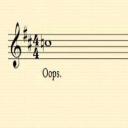Yahoo Answers is shutting down on May 4th, 2021 (Eastern Time) and beginning April 20th, 2021 (Eastern Time) the Yahoo Answers website will be in read-only mode. There will be no changes to other Yahoo properties or services, or your Yahoo account. You can find more information about the Yahoo Answers shutdown and how to download your data on this help page.
Trending News
Why does this happen?
Why is it that sometimes when playing, we make mistakes with easy things but get more difficult things right?
I've been learned a piano accompaniment for a student's violin exam. One of the pieces has block chords in close position in the right hand, and octaves in the left hand. The octaves jump around a fair bit. Every time I've played it, I've made mistakes with the right hand part, but the octaves I sight-read perfectly, and got correct every time since.
Granted, octaves are a strength of my playing, but they are physically more difficult than close-position block chords, which I have been able to handle since my first few weeks of playing the piano.
What causes things like this?
5 Answers
- NemesisLv 71 decade agoFavorite Answer
Glib as this may seem to be, it is *not* remotely meant so:
"Granted, octaves are a strength of my playing, but they are physically more difficult than close-position block chords, which I have been able to handle since my first few weeks of playing the piano."
Familiarity breeds contempt.... (It's a common hazard of all motor skills acquired by repetition: once conquered, they become 'furniture' and that's where the temptation of structural inattention starts to wreak havoc, given half a chance...)
There's nothing more sinister than that going on there, I'm sure.
Loively to hear, see & read you're back! :-)
Warmly, as always,
- Jack HerringLv 61 decade ago
Most hands will fit an octave very nicely and playing octaves usually only use finger 1-5 or 1-4. Playing block chords means you need to fill in notes in between the octave and the fingering for the inside notes have several variations. Easy to miss them and will require more concentrated practice to make the jumps and land correctly on the full chord.
I am not sure if this was your question. Sorry if I missed your point.
- 1 decade ago
I just relax my body and give all the strength needed from my shoulder to the fingertips. Relaxing is the main thing. Well, for blocked chords, you should play them slowly first. Then, once you are confident everything is fluent, you can start speeding up, and i always listen to the notes I'm playing and pay attention. It takes patience and time to practice piano.
Source(s): None. Just me:) - 1 decade ago
It's probably because your hands are not independent enough yet. Reading the music is dealt with the left hemisphere of the brain, which also controls the right hand (that's how it's wired up). While the left brain is occupied with reading the music, it neglects right hand function.
I made that up by the way, but it's probably something like that...
- How do you think about the answers? You can sign in to vote the answer.
- Anonymous1 decade ago
Because you pay more attention when playing difficult passages and get lazy with the "easy" parts.






